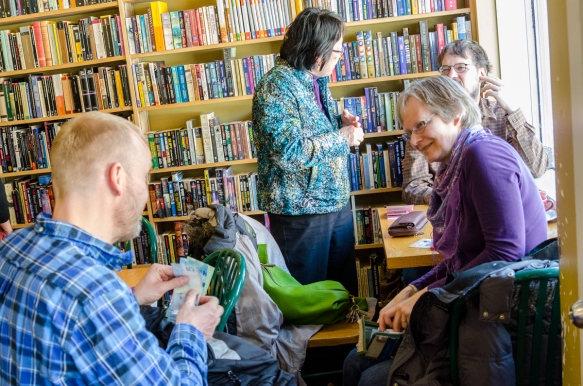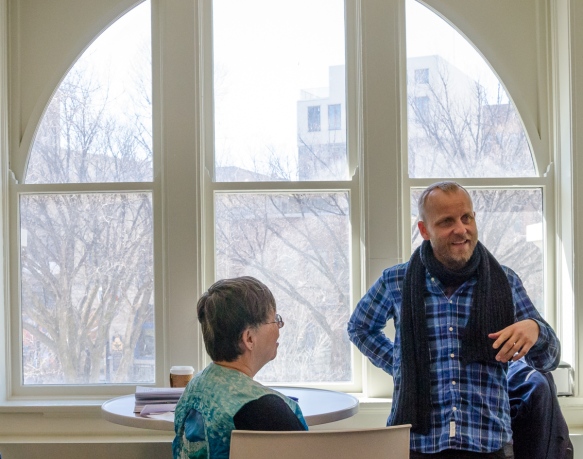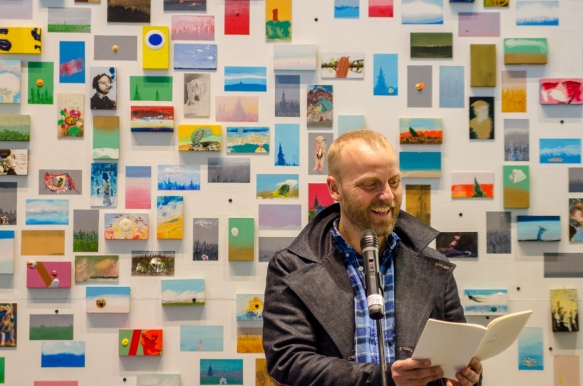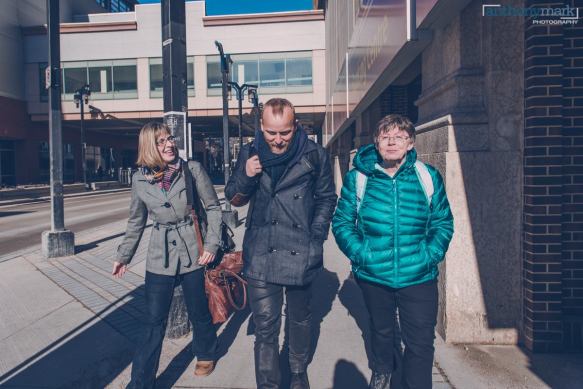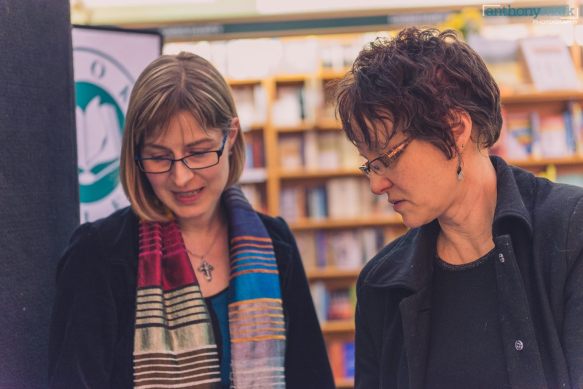On her blog Borrowing Bones, novelist Dora Dueck tagged me to carry the next leg of the “Canadian writers’ blog tour,” a chain letter that a.) doesn’t promise death by zombie if you don’t respond within 24 hours, b.) doesn’t spread lies about Bill Gates, c.) doesn’t make anyone angry at you for passing it on.
When Dora asked to tag me, she observed that I was a little behind in blogging. I started this blog to collect strategies for overcoming writer’s block, and it worked: now I’m so busy writing that I don’t have time to blog! Thanks, Dora, for the excuse to blog again. It’s good timing since I have big news.
1. What am I working on?
I have a poetry book coming out with Brick Books in fall 2016! It’s a collection of poems about longing for the experiences of a typical family and giving birth to unusual children instead.
The poems reveal both the ache and whimsy of autism. Through the public judgments, broken dreams and unspoken prayers, they trace our slow, unexpected bonding. From a newborn “glossed and quivering” to the fear of strange toilets, I hope to internalize the earthiness and transcendence of mother love – to startle readers with joy.
We don’t have a firm title yet, but we’ve nicknamed it “Zippered.” This domestic image suggests both the connection of two sides into one and separation of each individual into their own covering, both the comfort of a closed sweatshirt and the jaggedness of teeth. I’m playing with some fun titles about outer space too.
I also have arts grants to draft my second project: poems about my four Mennonite grandparents, my childhood memories, their histories, their deaths. These poems contain more nature images. Like the autism collection, I want joy and connection to be the final word.
2. How does my work differ from others in its genre?
My work differs from many poetry books in that it’s accessible to non-poets. Even poetry-haters. Language play and musicality are means to placing the reader/hearer within a new experience (such pulling their child off a bridge railing), not the ends in themselves. I love it when readers/hearers say, “I hate poetry, but this is so funny,” or “That was the first time a poem has made me cry.”
And it’s not like some books by parents of autistic children in that it’s celebratory. Books about autism often fall into these categories: my child is a fairy messenger from heaven, my child was cured by peppermint oil and puppets, or I wish my child were dead. The first downplays the difficulties and ODs readers on Sugar Twin, the second places guilt on families who’ve tried everything without improvement, and the third denies the dignity of human life in a way that makes me sick.
My book is honest about the adjustments, the fears, the exhaustion, as well as the goofiness, the surprising successes. If I promise any improvement, it’s in the parent and the relationship through the magic of acceptance.
3. Why do I write what I do?
I write to turn my life from a series of burnt cookies and lost keys into a work of art. Making a memory into a poem both memorializes the pleasure and redeems the pain. In a poem, I can hold onto my grandma a little longer. In a poem, I can see my mothering from the outside, find the humour, and offer myself grace.
I write for the fun of performing what I’ve written. For the joy of rubbing shoulders with other writers. And (I’ll be honest) I write for the praise. Hearing Brick’s acquisition editor (and one of my favourite poets) Barry Dempster say my manuscript “has guts and heart and takes loads of risks” meant almost as much to me as his request to shortlist it!
It’s been said about newspapers, preachers, and social activists that they “comfort the afflicted and afflict the comfortable.” “Afflict” is too strong a word for my poetry, but my editor said, “it shakes up some of her complacencies.” I hope that my poems change the way the uninitiated see the screaming child in the checkout line and the mother who’s distracting him with his DS instead of threatening punishment. And in a time when we’re debating assisted suicide, I hope my poems about my grandpa show that meaningful connection and dementia are not mutually exclusive.
The comforting piece is even bigger for me. I want parents and individuals with autism to see themselves in some of my poems and feel like someone else “gets it.” Someone interrupted me once at my reading to say, “I have autism and I want to thank you. Your stories are very encouraging.” That’s why I write what I do.
4. How does my writing process work?
The biggest step in becoming a poet for me was overcoming perfectionism: learned to be okay with writing crap. If anyone read my notebooks, I’d be mortified. Crazy lines about French fries in the snow next to itchy skulls and imprinting goslings. One out of every 100 crazy lines grows into duller than dull prose. Then I pull out the phrases that grab me (something Erin Moure taught me called “finding the heat”) and write material around them. I try the text in long lines and short lines.
Workshopping is a huge part of my process. I take every Manitoba Writers’ Guild poetry class I can. And a new poem is not ready for the public until it’s passed Joanne Epp and whoever else joins our little writers’ group. In the beginning (2012), it was Melanie Dennis Unrau; for the last year, it’s been Sue Wonnek. They see musical sound combinations I didn’t realize I was making and find places where I’ve left key elements in my head instead of on the page.
And speaking of Joanne: I’ve tagged her “Words and Music” blog at joanneepp.com as the next stop on the blog tour. She has a book coming out this spring that I cannot wait to read.



